WDI is supporting commercialization of gasification technology, which generates renewable power and organic fertilizer/biochar from agricultural waste. With a grant from the Michigan Translational Research and Commercialization (MTRAC) Innovation Hub for AgBio at Michigan State University, WDI worked with Jose Alfaro, assistant professor of practice at U-M’s School for Environment and Sustainability and WDI Research Fellow. As part of the project, WDI completed market studies for the initial markets of Costa Rica and Michigan, supported advancements in the engineering and design of a commercial-scale product, and initiated commercial agreements with partners and customers.
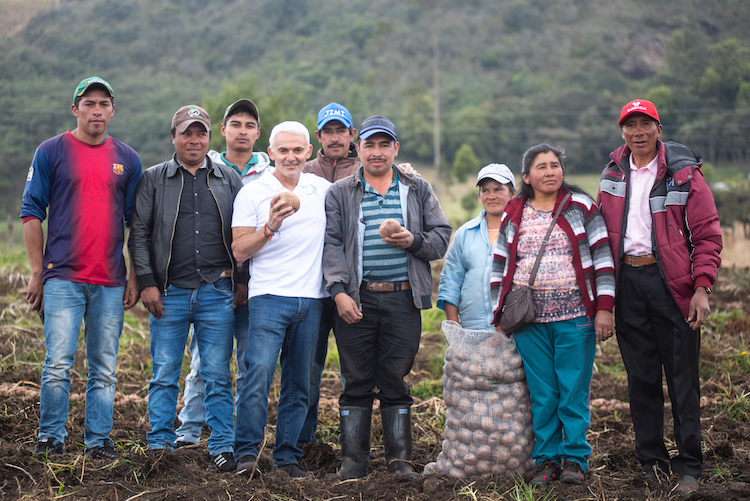
Frank Giustra meets with Acceso Colombia potato farmers in Boyacá, Colombia.
Note: The following interview was originally published on NextBillion.net, which is managed by WDI.
Several months before the COVID-19 crisis began, I reached out to the communications professionals at the Clinton Giustra Enterprise Partnership (CGEP). I had hoped to talk to them about the organization’s spin-off from the Clinton Foundation into what they were now calling Acceso, a new entity focused on building businesses and connecting them to the broader marketplace, particularly in Latin America.
I was pleasantly surprised to be put in contact with Frank Giustra himself, the Canadian businessman and philanthropist who created CGEP through a $100 million donation to the Clinton Foundation. Giustra is a mining financier who also founded Lionsgate Entertainment before turning his attention to philanthropy. (See previous articles about CGEP’s work here and here).
Since that time, the COVID-19 pandemic has put a lot of work on hold. But thanks to the assistance of Acceso’s communications team and to Giustra himself, our interview remained on track. In the following Q&A, he explains Acceso’s new direction as an independent entity, how it is investing directly in small businesses, and several things he’s learned as one of the early financiers in socially focused enterprise development.
Sidenote: Giustra’s connections with the Clinton family have led to some critical press coverage over the years. Whether readers see those topics as legitimate controversies or conspiracy theories, they are not what this interview is about. And as a nonprofit media site that endeavors to avoid politics, we won’t linger on those issues. Still, there are many valid critiques of the role of billionaires in philanthropy and impact investment. To his credit, Giustra fielded my question on the topic.
(Full disclosure: NextBillion’s parent organization, the William Davidson Institute at the University of Michigan, has worked with CGEP in the past. You can read more about that project here.)
Scott Anderson: We began this discussion several weeks before the COVID-19 crisis started. It seems appropriate to first talk about what impact it is having on the work of Acceso and its businesses. How are they adapting?
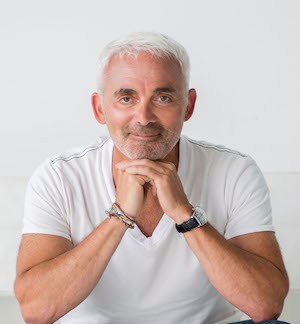
Frank Giustra
Frank Giustra: Our businesses are a critical source of food for local communities in the countries where we work – in addition to a continual source of income for thousands of farmers. Our businesses have been able to stay open, as we are essential supply chains. Thankfully revenues have not dropped drastically yet, as our supermarket and retail clients have maintained demand; however, there has definitely been a drop in demand from restaurant chains, and we are in the process of assessing how that will impact 2020 results – and any additional funding support we may need.
Where our products are part of broader social or nutrition-based projects (like in Haiti where we supply organizations like Partners in Health and schools, and in Colombia and Venezuela where we supply food kitchens run by ABACO Colombia, World Central Kitchen and Wayuu Taya Foundation with fresh produce to feed Venezuelan refugees) we are doing our best to maintain our deliveries, if not increase them. I’m proud of our team for stepping up to the challenge and working so hard during this difficult time – and our priority is keeping our teams, farmers and supply chains safe.
SA: My impression is that Acceso was structured very differently than many other foundations, particularly for the time when you began building businesses about seven years ago. For one, investments were made directly in agribusinesses that work closely with smallholder farmers and fishers. Can you explain the motivation for establishing the organization in this way?
FG: My mission has always been to find sustainable ways to alleviate poverty. We approached poverty alleviation in two distinct phases during our 12-year history [at CGEP]. During the early years of the organization (2007-2012), we supported multiple health and economic development projects through grant funding and project management. These projects included cataract surgeries, maternal and child nutrition, and farmer training to name a few. We determined that while these projects certainly had impact in their communities, they were not very sustainable because they relied heavily on grant funding; and they were not scalable or replicable as they were fairly unique and targeted to specific communities.
Based on a strategic review of Acceso’s early projects, I felt that we were not doing enough. I really wanted us to have a game changer, something more sustainable and impactful. Beginning in 2012-2013, we decided to test a social business model with the goal of building, investing start-up capital into, and scaling businesses that were replicable. I was prepared to take the early-stage risk and put in the start-up capital to do this. The intention behind building for-profit social businesses is that the profits are meant to be reinvested into the business. Without profits, our work will not be sustainable. Also, until we landed on our current model, I never felt our impact could be substantial enough.
We also decided to build the capacity and expertise of building businesses in-house, so that we could develop a rigorous process, learn from our experience and adapt it to new geographies to become more efficient and successful at replicating. Many impact investors are looking for profitable or close to profitable businesses, but we were prepared to actually build from scratch. Fortunately, looking back on that decision, it seems to have played out well. It hasn’t been easy and there have been a lot of challenges. But in seeing our businesses in El Salvador, Haiti and Colombia firsthand during a trip I made at the beginning of March, I am very impressed with the work our teams have done, and I’m convinced we have a successful model that can be replicated in other countries, either by us or by other organizations.
SA: Acceso seemed to take more of a systems approach in the realm of agribusiness, connecting smaller players to the larger supply chain and distribution channels. In the first few years, what sorts of metrics did you examine to see if you were on the right track?
FG: I’m glad you raise this question, because a systems approach and establishing businesses tailored to market needs are core to our model. We effectively reverse engineer from demand to build our businesses: First, we understand market needs and challenges, and then we assess how we can bridge the gap between the market (large retailers, supermarkets, restaurants and other buyers) and small producers. There are both financial and social metrics that have been key to assessing our impact. On the social impact side, we focused on increasing farmer incomes and creating jobs:
On the financial or commercial side, we look at key metrics like sales and profit with the goal of reaching profitability within five years. Our approach is always market driven. In our early years, we really focused on making sure we had the right product mix and the right clients so that we could grow and scale into local channels/markets. Larger clients typically have higher quality standards, but we knew that they were key to growth, so we monitored farmer production very closely and implemented necessary practices like Good Agricultural Practices training to make sure they were where we needed them to be.
SA: Are there a few success stories that come to mind?
FG: One of our main success stories is our partnership with Super Selectos, El Salvador’s largest supermarket chain, which has more than 100 local stores. With the intention to support economic development in local communities, by partnering with Acceso they were able to increase their local sourcing from less than 10% to more than 50% within a few years. Acceso also grew from becoming a small supplier to their largest supplier by sales and volumes. Both organizations consider this a win-win, as our partnership has created opportunities for local farming communities while also boosting the local economy. We’ve also spoken to multiple farmers who have either moved back from the U.S. or decided not to move to the U.S., as they realized how profitable farming could be. I think it’s incredible that we can help reverse the flow of migration.
SA: There must have been at least some failures. Can you cite a couple and discuss what you learned from them?
FG: I am glad that we had the chance to test different models in different geographies over the past several years. While we’re currently focused on building and managing agribusinesses in Latin America and the Caribbean, we also piloted and built several agribusinesses in Africa and Asia, as well as tested and built inclusive distribution businesses in several countries, and a vocational training business in Colombia. Some of these businesses were more successful than others, and we ultimately decided to focus on the agribusiness model as we had achieved strong proof of concept within a reasonable timeframe, while transferring other successful pilots or businesses to partners.
In our early years of building businesses, we ended up closing one of our agribusinesses because it was a new product which involved a fair amount of uncontrollable risk related to weather and potential crop spoilage. This was a joint decision between us and our buyer/partner. The main lesson we learned is that building successful, profitable businesses is not easy; it takes time and hard work, and even more so when working with low-income populations. Patient capital and the right partners who genuinely care about social impact (beyond public relations), who have “skin in the game,” and who understand the risks of working with small producers and entrepreneurs are supremely important. We also learned from past projects that if we did not assess demand or the market first, all of our work and funding on the supply/farmer side (training, etc.) may not result in high social impact or sustainability.
SA: Philanthropy is facing a good deal of skepticism these days from many sources. There’s been growing concern that philanthropic organizations that are established by billionaires, no matter how well-intentioned, are mainly a salve to social/environmental ills, and that policy makers really should focus on increasing marginal tax rates on high net-worth individuals to pay for more social programs. What is your response to that?
FG: I am not a billionaire and never will be, as I give my money away too fast to ever become one. I personally don’t believe there should be billionaires, period. I would also like to direct readers to a recent article I wrote entitled “Who Wants to be a Billionaire? I Don’t”.
SA: Impact investing has come a long way in the last 13 years. We’ve definitely been witness to a mainstreaming of ESG as well. What do you consider the greatest mark(s) of progress – and what is concerning you on the horizon?
FG: I’ve seen a real change in the world of philanthropy over the last 10-15 years. Donors want to see a return on their giving. They want to see that projects can be sustainable, as opposed to being funded continuously year after year. It’s therefore not surprising to me (and personally encouraging) that impact investing is becoming more mainstream, driven by increased social consciousness. In the last few years, we’re also seeing more and more international non-profits getting into impact investing, which is a sign that organizations are thinking about the sustainability of their work relative to traditional philanthropic models.
One mark of progress we’ve seen is a subset of impact investors who are truly “social first.” This includes some of our partners, such as Acumen in Colombia and Global Partnerships in El Salvador. We’re also seeing collaboration between grant funders and impact investors, particularly in the early stages of a social business – which is critical to de-risk investments, paving the way for later-stage investors. Finally, we have been encouraged by innovative funding models such as Kiva’s crowdfunding program for social enterprises, which our business in El Salvador has benefitted from.
Related to that, an ongoing area of concern is that the funding needs of the “missing middle” (social businesses with funding needs roughly between $100,000 to $2 million) are still largely unmet, particularly in the smallholder agriculture space. Traditional fund structures, including those of some impact investors, are not set up to efficiently deploy capital at those lower ticket sizes, meaning that it is still inherently difficult for many impact investors to be truly social-first. Some investors still believe it’s fairly easy to be profitable early on while solving major issues, and the truth is that businesses working with very poor populations have a whole set of challenges that investors have to understand and factor into their risk tolerance.
SA: Finally, CGEP recently spun off from the Clinton Foundation and established itself as Acceso. Can you explain why this is happening now – and how will Acceso operate with this new structure?
FG: Last year, I made the announcement that I was stepping down from my business interests and would focus the majority of my time on my philanthropy. I love my philanthropic work with all my heart. I consider Acceso my life’s work. I enjoy being hands-on and I get real satisfaction spending time with our beneficiaries. This was the highlight of my trip to our businesses in March: hearing the stories of farmers and employees, and figuring out what opportunities we still have to grow.
In relation to spinning off from the Clinton Foundation, this is an exciting next step and a natural evolution for us. As a builder of social businesses, I believe Acceso’s operating model is suited for an independent organization. I am grateful to the Clinton Foundation for their partnership, and I’m also excited about this new phase as I take on full management of our work. I know our team is excited about this new phase as Acceso as well. Our focus remains building, managing and scaling agribusinesses in Latin America and the Caribbean to sustainably lift farmers and fishers out of poverty, and identifying opportunities for future replication. The day-to-day operations of our local Acceso businesses remain the same, and we are looking forward to expanding our work alongside current partners – as well as increasing our investor base as we have done in the last one to two years. I truly believe we are a leading showcase and success story for social businesses in the agriculture space.
Photos courtesy of Paramo Films / Acceso.

Scott Anderson is communications manager at the William Davidson Institute.
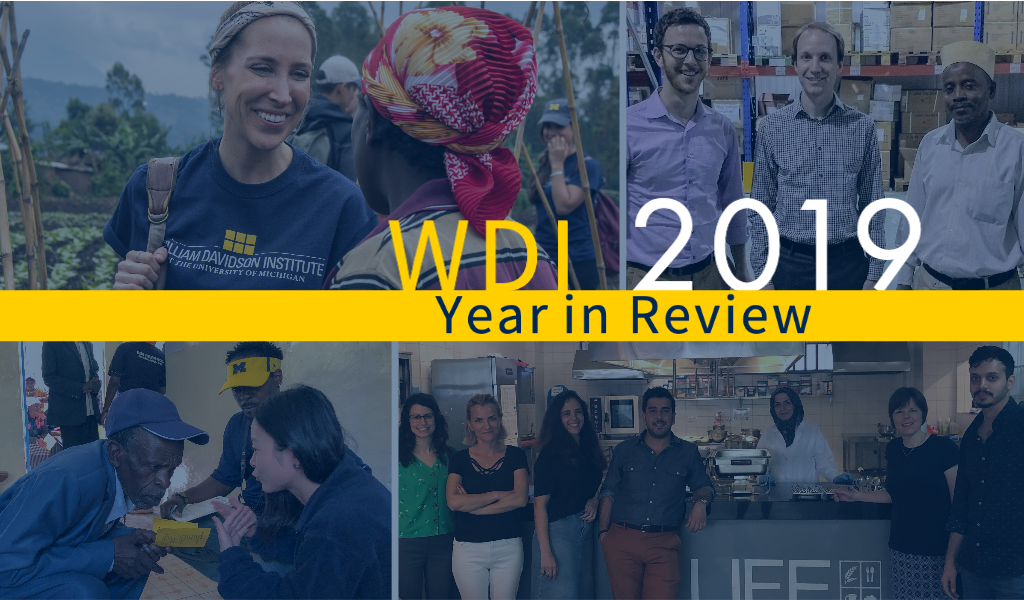
“These relationships flow both ways: faculty turn to us for help in their work and we will incorporate them in specific projects we are working on. Our work increasingly integrates our expertise between sectors within WDI as well as with the expertise across the university.”
—Paul Clyde, President of WDI
WDI teams of staff and/or students worked on nearly 50 projects in more than 30 countries in 2019. Our work focused on our core consulting sectors – education, energy, finance and healthcare, as well as our management education programs, entrepreneurship development, measurement and evaluation services and the deployment of University of Michigan graduate students around the world. In the course of the year, WDI worked with faculty and researchers at the U-M Ross School of Business, the Zell Lurie Institute, Law School, the School of Public Health, the College of Engineering, the School of Nursing, the College of Literature, Science and Arts, School of Education, College of Pharmacy, Medical School, Kellogg Eye Center, School of Information, and the School of Environment and Sustainability.
“Our work capitalizes on the expertise of our staff as well as the expertise across campus,” said WDI President Paul Clyde. “Over the past 12 months we have worked with 30 faculty and many students from Ross but also students and/or faculty from a number of other schools within U-M. These relationships flow both ways: faculty turn to us for help in their work and we will incorporate them in specific projects we are working on. Our work increasingly integrates our expertise between sectors within WDI as well as with the expertise across the university.”
Here is a closer look at some highlights from 2019:
The Education consulting sector and its Entrepreneurship Development Center (EDC) continued its work on the LIFE Project, which supports refugees in Turkey as they become entrepreneurs in the food sector. In July, WDI staff members Amy Gillett and Kristin Kelterborn and faculty affiliate Eric Fretz visited the Turkish cities of Istanbul and Mersin. Watch a narrated slideshow below of their trip that details the work they did while there and the program graduates they met. Gillett and Kelterborn also wrote an article for WDI’s affiliated NextBillion website on how to accelerate the success of refugee entrepreneurs.
Building off the success of its M2GATE Program (for more on the program, watch a video below here), WDI’s Education sector is facilitating a new virtual exchange course at the U-M Ross School of Business. Read about Business & Culture: A Virtual Practicum here. And read a WDI Impact Report on virtual exchange written in March.
The Education team also delivered another successful leadership workshop for NGOs in Central and Eastern Europe. Watch an entertaining and informative video on the latest workshop here. The next NGO workshop will take place in May 2020 in Warsaw, Poland.
WDI’s Energy consulting sector, established formally in 2018, explored the hot topic of renewable mini-grids to increase energy access. Specifically, the energy team is beginning to work with local partners in the Bagladeshi village of Bagdumur to determine the viability of a mini-grid there. In early 2019, WDI also deployed graduate students from the U-M’s School for Environment and Sustainability to study how energy enterprises in India and Uganda perform and how best to document it.
WDI’s Healthcare consulting sector team members Michael Krautmann and Ben Davis traveled to Tanzania for a U.S. Agency for International Development project to help strengthen that country’s health supply chain systems. Krautmann also sat down for a Q&A about his supply chain work at WDI, and Healthcare sector faculty affiliate Ari Schwayder answered five questions about his favorite health projects to work on.
WDI’s Healthcare team also conducted a project with the Linked Foundation to inform social enterprise, med-tech, digital health, and private sector investment in Latin America. The Foundation seeks to identify market-based, impact investment opportunities specific to women’s health in Latin America, based on an integrated assessment of the major unmet needs in combination with identification of high-impact solutions and opportunities to foster the enterprise ecosystem and sustainable women’s health solutions. WDI developed an analytic methodology, conducted a landscaping study for Colombia and Peru, and will be publishing the report in January 2020. WDI and the Linked Foundation also had the opportunity to present project findings at four conference settings in the U.S. and Latin America in fall 2019. Linked anticipates this work will inform their investment strategy and catalyze additional resources to the most-needed areas in women’s health in Latin America.
WDI President Paul Clyde wrote an article exploring the profit potential for health care companies in low- and middle-income countries.
WDI Vice President for Healthcare Pascale Leroueil continued her work helping global health organizations such as Global Fund, Gavi and WHO to increase the impact of their investments.
At the beginning of 2019, WDI Vice President of Administration Claire Hogikyan traveled to Ethiopia as the first phase of work to help that country find a sustainable solution to its medical waste problem. Her trip led to the deployment of a team of Ross School graduate students a couple of months later. They developed a proposal that was presented to government officials by an organization that plans to begin operations in early 2020 of a medical waste incinerator outside Addis Ababa.
WDI’s Finance consulting sector partnered with the Ross School of Business and Professor Gautam Kaul on a first-of-its-kind curriculum-based, student-run international investment fund.
The Finance sector team also partnered with Awash Bank in Ethiopia to study a remittance program to increase peoples’ access to capital. How the program would work is explained in this infographic and in this concept note.
In 2019, the Performance Measurement & Improvement (PMI) team continued work on several ongoing projects, including whether developmental evaluation works in a USAID context and using impact data to develop strategies to increase engagement of women in Colombia’s coffee sector. PMI Senior Research Associate Rebecca Baylor also shared her views in an article exploring whether developmental evaluation is an appropriate assessment strategy.
PMI also collaborated with other WDI consulting sectors such as Education, Energy and Healthcare to provide assessment services on their projects, including evaluating the impact of the Business and Culture course. Working alongside the PMI team on that project is WDI Faculty Affiliate Andy Grogan-Kaylor. Read a Q&A about his work and why he enjoys collaborating with the PMI team.
The PMI team also attended several conference proceedings in the impact measurement field and often spoke on panels and roundtables about their work. They led several discussions at the November 2019 American Evaluation Association annual conference. After attending and moderating a discussion at a global metrics conference, Baylor wrote about what is being done to incorporate gender equality into the impact measurement space.
The past year featured several opportunities for University of Michigan students to participate in WDI-sponsored projects. In all, 76 U-M students traveled abroad for WDI work.
Occasionally, students may participate in multiple WDI-sponsored projects. To reward these hard-working, committed students, WDI established the Davidson Field Scholar program. There are currently nine students who have earned this honor.
WDI sponsored 11 Multidisciplinary Action Project (MAP) teams in 2019, and deployed five teams to five countries to study ways to improve healthcare delivery there. One MAP team member who worked in Rwanda recorded her thoughts about the project for a narrated slideshow. (See below).
And we also caught up with a couple of former students – one in South Korea and the other in India – who participated in WDI student projects to see how working on these projects impacted their career paths.
“While I knew it would serve as a useful resource, I did not realize just how helpful the Institute would be until I got to Ross and started interacting with the staff and professors associated with WDI,” Puneet Goenka, WDI alumnus said.
And as part of the WDI Global Impact Speaker Series, the Institute hosted four guest speakers – Sally Stephens of Medicines360; Tami Kesselman of Aligned Investing Global; Ujjwal Kumar of Honeywell and Efosa Ojomo of the Clayton Christensen Institute. Watch an interview with Stephens here; an interview with Kesselman here; and watch Ojomo’s talk here.
In winter 2019, WDI sponsored 11 Multidisciplinary Action Project (MAP) teams that worked for organizations around the world. Each team was comprised of four MBA students from the University of Michigan’s Ross School of Business.
One team—Lauren Baum, Nadia Kapper, Paul Mancheski, Jason Yu—spent three weeks in Rwanda working for The Ihangane Project (TIP) to develop a business model to grow a ready-to-use therapeutic food that is used to treat severe, acute malnutrition. Through photos and the words of MAP team member Nadia Kapper, here is the story of the work they did in Rwanda, the impact they had and the memories they made.
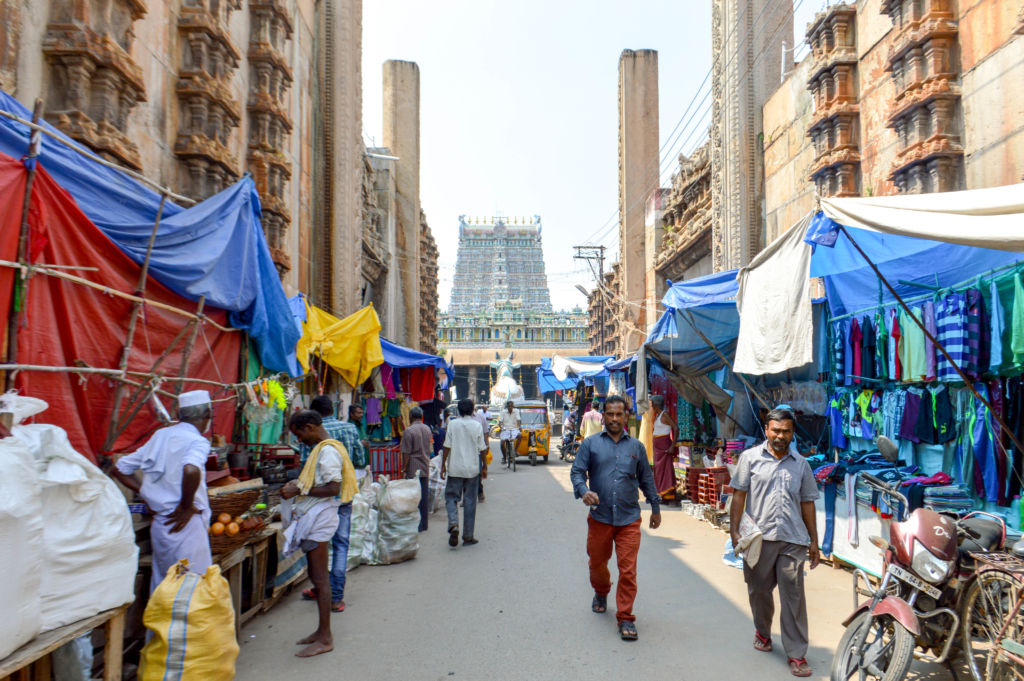
My grandfather was a farmer from Farley, Iowa, but in many ways he was also an entrepreneur. He experimented with innovative farming techniques, calculated and assumed financial risks in unpredictable environments and, most importantly, created value-added products for his customers. Like any effective executive, he managed multiple streams of revenue, aligned short-term objectives with steadfast goals, and grounded his decision-making in sustainability, which prioritizes long-term profitability. His land was both a business and a source of livelihood for himself and his community. It provided income and employment, food and shelter, stability and prosperity. Indeed, this is the impact and importance of entrepreneurship: It is, at its core, dignifying.
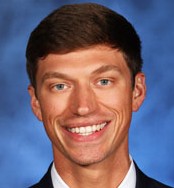
Chris Owen
But more recently, for farmers in both the U.S. and India, the narrative has been quite different. Water wars, climate change and debilitating debt due to stagnant crop prices have made their profession less about dignity and more about survival. Farming, it seems, has become a bad business. Many farmers are being forced to abandon their rural communities in search of “greyer pastures” in growing urban centers. In India alone, these urban centers are expected to grow by 250 million residents during the next 20 years. Rural Indians are moving into cities for work, the lure of modern conveniences, or simply to be closer to fellow migrant family members. Considering that India will also have the largest millennial workforce in the world by 2027, we must ask: How will cities sustain their residents’ need for fresh food, clean water, waste management and gainful employment? Government funds are already being stretched thin by increasing demands on transportation infrastructure, an expanding energy grid and other public services. National or international aid organizations may provide relief for society’s most destitute, but that still leaves a large middle class searching for economic stability—as well as lingering concerns regarding environmental sustainability and community cohesion.
Addressing these concerns is the primary purpose of Poornatha—the Madurai-based social enterprise with which I partnered as a WDI Global Impact Fellow this past summer. The mission of Poornatha is to foster socio-economic vibrancy and entrepreneurial resilience that contributes to cultural preservation and community-building throughout India. In collaboration with the Michigan Academy for the Development of Entrepreneurs (MADE) and WDI, we began an effort to co-design a scalable, transferable, affordable coaching curriculum for entrepreneurs in emerging economies. The goal of this program is to equip and empower entrepreneurs as values-centered, data-driven decision-makers who build enduringly successful businesses that strengthen their local communities. Over the course of 10 weeks, the team of four coaches and I interviewed two dozen entrepreneurs in Madurai to identify their most salient needs as business leaders. What were their most pressing skill or knowledge gaps? What were their specific market opportunities or business growth goals? What were the core values of their organizations? These conversations informed what is now an entrepreneurship education program for leaders of family-owned businesses, featuring training in cash flow analysis, marketing and brand management, leadership development and, most importantly, sustainable strategic decision-making.
Madurai has been an ideal test site for this program. Located in the southern state of Tamil Nadu, Madurai is both a holy site and a gritty industrial center nicknamed “The Temple City” and “The City that Never Sleeps.” Reminiscent of an American Rust Belt metropolis, it is home to rubber factories and sand mines, raw material distributors and textile manufacturers—and an engaged entrepreneurship network grappling with an influx of residents from surrounding rural communities. Though many business owners in the Poornatha Network are simply trying to provide sustenance for their families while navigating complex competitive markets, most also acknowledge and advocate for business practices that promote economic, environmental and social well-being. The challenge, of course, is identifying and incorporating these win-win-win solutions into traditional businesses models.
Entrepreneurship in India is primarily associated with local job-creation rather than scalable innovation. This focus does indeed promote human dignity by fostering local socio-economic vibrancy, but it also bypasses another important contribution of business to society: the creation of new products or services that address pressing human and/or environmental needs. It is these eco-innovations that will transform markets and enable local entrepreneurs to apply—and benefit from—the “both/and” triple-bottom-line approach to decision-making.
My grandfather lived on the same piece of land nearly his entire life. For his 80th birthday party, the list of attendees was so long that our family had to rent City Hall for the reception. He was a hometown hero—a food grower, a job provider and a respected cornerstone of his community. He was, in my mind, a triple-bottom-line entrepreneur who lived with dignity by cultivating the dignity within those around him. Though this permanence of place may be a luxury for most farmers, rural residents, small business owners and urbanites living in India today, Poornatha hopes that this new entrepreneurship education program will nurture a business ecosystem that promotes socio-economic vibrancy, sustainability and, most importantly, human dignity throughout Tamil Nadu and beyond.
Chris Owen is a dual-degree student at the Ross School of Business and the School for Environment and Sustainability at the University of Michigan.
This article was originally published on NextBillion, which is managed by WDI.
Image: Market in Madurai, India (via Francisco Anzola)
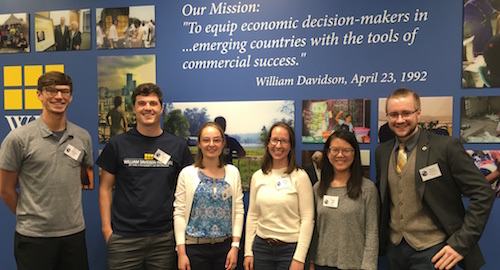
WDI’s 2018 summer interns before they set off on their voyages.
Over the years, WDI’s summer interns have faced unique challenges as they have conducted their work across the globe for the Institute and its partners. Impassable roads, extreme weather, the occasional wild animal. An active volcano can now be added to the list.
WDI intern Nadia Putri spent her summer in Bali, Indonesia working with East Bali Cashews on quality improvement projects, measuring the company’s impact on women and developing a U.S. market entry strategy. She also got an up close look at emergency preparedness.
“It was really beautiful, but a bit scary at the same time for someone who has never seen anything like it before,” she wrote of watching the sparks of lava and plume of smoke rise from the crater near where she was working. The cashew factory was outside the evacuation zone but management kept a daily eye on the volcano in case conditions changed. Earthquakes in the region have claimed nearly 400 lives during August.
Putri was one of six WDI interns working internationally this summer. Some, like Putri, have returned to the University of Michigan campus; others are finishing up their work and will be back in Ann Arbor soon. While overseas, the interns contributed to a blog to chronicle not only their work but also the experience of living in a foreign land. WDI has highlighted some of the work below and the full blog chronicling interns’ experiences is available here.
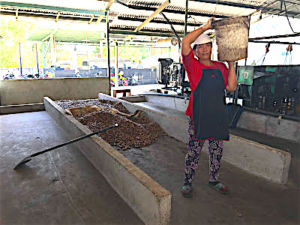
East Bali Cashews where Putri worked sources sustainably grown cashews from nearby smallholder farmers and processes them in a factory located in a remote village in one of Bali’s poorest regions. Since its launch in 2012, the company has integrated various social missions in and around its cashew processing operations, including community improvement and women’s empowerment.
Putri, a Ross School of Business MBA candidate, said factory workers were very supportive of her work and willing to explain how the company has impacted them. One employee recalled being hired after graduating from high school and is now in charge of 50 workers.
“At the factory, everyone is very welcoming and open to share their stories,” Putri wrote in her blog. “It’s especially humbling to see such high curiosity and willingness to learn from the factory employees. This serves as my daily reminder that (the) situation you grew up or lived in does not define who you could be.”
In Kenya, Andrea Arathoon, a School of Public Health graduate student, was tasked with helping a local maternity hospital reduce costs and increase patient volumes to achieve sustainability while also maintaining quality. One intervention Arathoon worked on for Jacaranda Maternity is a new outpatient care checklist for prenatal visits.
 The checklist is designed to improve patient processing within the outpatient clinic. This improved flow will reduce wait times and result in more efficient consultations, thus increasing patient volume and reducing costs, Arathoon wrote. She ensured the checklist followed the World Health Organization and Kenya Ministry of Health guidelines. The hospital’s doctors, nurses and administrative staff were consulted, and everyone was trained on how to properly use the new tool.
The checklist is designed to improve patient processing within the outpatient clinic. This improved flow will reduce wait times and result in more efficient consultations, thus increasing patient volume and reducing costs, Arathoon wrote. She ensured the checklist followed the World Health Organization and Kenya Ministry of Health guidelines. The hospital’s doctors, nurses and administrative staff were consulted, and everyone was trained on how to properly use the new tool.
“I am very excited about my summer project and the impact that it can have in improving maternity care for women and children in the country,” Arathoon wrote on the blog.
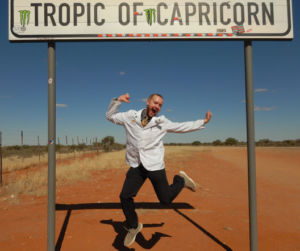
Across Africa on the Atlantic coast, Mason Benjamin is working in Namibia on pharmacy workforce development and hospital pharmacy practice. Benjamin, a College of Pharmacy graduate student, joined a collaborative project between WDI and the International Pharmaceutical Federation Hospital Pharmacy Section. The goal of the project, which includes the University of Namibia School of Pharmacy, is to increase the capacity of hospital pharmacists in Namibia through in-country diagnostics and technical assistance.
Benjamin has been traveling all across the country to visit hospital pharmacies in different regions to develop a landscape analysis of hospital pharmacy practices at both private and public hospitals. Before his site visits began, Benjamin attended the Medication Utilization Review In Africa (MURIA) conference, where he learned about pharmacy practice not only in Namibia but also across Africa.
“I was aware of how different the healthcare system in the United States might be from anywhere else in the world, but always felt that researching other systems online had its limits,” Benjamin wrote in the blog. “I much prefer to learn right from the source and in person, so I was grateful for the opportunity to ask questions to practicing pharmacists from over a dozen different African countries about how things worked in their setting.”
In India, the population of cities is expected to increase by 250 million people in the next 20 years, making employment a crucial need for the new transplants. Ross School of Business MBA student Chris Owen is working with MADE (Michigan Academy for the Development of Entrepreneurs) and its Madurai-based partner Poornatha, which is designing an affordable, world-class coaching curriculum for entrepreneurs in emerging economies. MADE was founded by WDI and U-M’s Zell Lurie Institute.
Owen is identifying best practices of existing coaching programs in India and other emerging economies, conducting a needs assessment of entrepreneurs in Madurai and developing a framework and training curriculum for how coaches will be identified, on-boarded and trained.
“By investing in strong local economies, India can address its dual-challenges of rapid urbanization and rising unemployment,” Owen wrote on the intern blog. “Indeed, for this reason, entrepreneurship in India – and the work of Poornatha – is becoming increasingly important.”
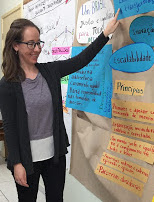 In Brazil, Rebecca Grossman-Kahn – a student at Ross and the U-M Medical School – is developing a tool to assess the social impact of the gender equality programs of Plan International’s Brazil office. Plan International has a long history of advocating for children’s rights but recently decided to focus its work in Brazil on promoting girls’ rights and equality. Gender roles in Brazil tend to be rigid and many girls stop studying in middle or high school to help with housework at home, Grossman-Kahn wrote on the blog. She attended a staff retreat to strategize on how to combat resistance from community members and organizations regarding Plan’s new focus on gender.
In Brazil, Rebecca Grossman-Kahn – a student at Ross and the U-M Medical School – is developing a tool to assess the social impact of the gender equality programs of Plan International’s Brazil office. Plan International has a long history of advocating for children’s rights but recently decided to focus its work in Brazil on promoting girls’ rights and equality. Gender roles in Brazil tend to be rigid and many girls stop studying in middle or high school to help with housework at home, Grossman-Kahn wrote on the blog. She attended a staff retreat to strategize on how to combat resistance from community members and organizations regarding Plan’s new focus on gender.
While at the retreat, a new World Bank report was released that showed girls who complete secondary education can expect to earn twice as much as those with no education.
“Studies like this can help get community leaders on board with Plan’s mission,” Grossman-Kahn wrote.
In Nepal, nearly two out of three working people are farmers. But the country’s rugged topography and lack of infrastructure makes it difficult to farm year-round despite a lengthy monsoon season. Additionally, in rural Nepal, only 5 percent of the population has reliable access to electricity. But the country has more than 300 days of sunshine, making it a perfect candidate for solar-powered agricultural services.
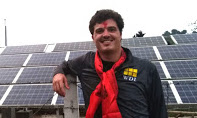 Matthew Carney, a dual degree student at Ross and the U-M School for Environment and Sustainability, spent the summer with the solar startup Ecoprise to help bring solar-powered agricultural services to subsistence farmers in the Terai region of Nepal that borders India. AgroHub, a pay-as-you-go service-based business model recently started by Ecoprise, provides access to solar-powered infrastructure for remote, underserved farming communities. These hubs provide farmers with access to equipment for irrigation, clean drinking water, food-processing and refrigerated post-harvest storage as a service.
Matthew Carney, a dual degree student at Ross and the U-M School for Environment and Sustainability, spent the summer with the solar startup Ecoprise to help bring solar-powered agricultural services to subsistence farmers in the Terai region of Nepal that borders India. AgroHub, a pay-as-you-go service-based business model recently started by Ecoprise, provides access to solar-powered infrastructure for remote, underserved farming communities. These hubs provide farmers with access to equipment for irrigation, clean drinking water, food-processing and refrigerated post-harvest storage as a service.
AgroHub has proved very successful for those farmers who have used it, allowing them to irrigate more land during the winter and monsoon seasons and reducing the use of diesel-powered water pumps that saves money. Carney’s task is to develop a plan to bring the service to farmers in western Nepal.
“Solar-powered agriculture presents an opportunity to raise the living standards of millions of rural Nepali farmers in a sustainable fashion,” he wrote. “It would be a shame to waste it.”
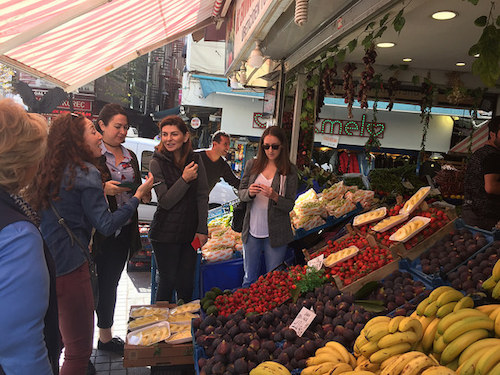
Members of the LIFE project consortium visit a produce stand in Turkey and interviews the owner on how a green grocer sources his produce and his perspective on how he could potentially benefit from the LIFE Food Enterprise Center.
Food can be a powerful means to a more peaceful world because it encourages conversation, cross-cultural engagement and understanding during troubled times, according to the next speaker for the WDI Global Impact Speaker Series.
Johanna Mendelson Forman, a leading voice in the emerging movement of gastrodiplomacy and social gastronomy, will talk about how food can promote social good at her talk, “Can a Hamburger Build World Peace? Lessons on How Food Builds Community One Plate at a Time.” Her talk will be at 5 p.m. on Wednesday, April 4 in Room R2220 at the Ross School of Business. It is free and open to the public.
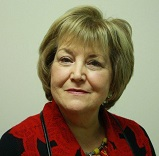
Mendelson Forman
Mendelson Forman said a revolution is building in which food has become a vehicle for a generation that features chefs as political actors, farmers as champions of environmental sustainability and businesses that have embraced the belief that investment in the entire supply chain is good for business. Young social entrepreneurs are combining food and their business expertise to promote social good with new apps and new inventions. Refugees are learning to cook in their new land in order to gain respect and sow hope.
“Everyone has memories about dishes they ate growing up,” said Kristin Babbie Kelterborn, a WDI senior project manager. “Many times, these recipes have been passed down through generations, giving us a way to feel connected to our culture, bond with others and shape our identity. In many cultures, food is incredibly significant; it is a way of showing hospitality, love and respect.”
“Dr. Mendelson Forman’s presentation will provide insight on what happens when people from different backgrounds share their food cultures with one another. She will talk about a food entrepreneurship project that WDI is currently involved in, which uses food to promote cross-cultural exchange between refugees and host communities in Turkey.”
Under WDI’s Entrepreneurship Development Center, Kelterborn is working on a project, led by the Center for International Private Enterprise and implemented with a consortium of U.S. and Turkey-based partners that aims to develop sustainable livelihoods in the food sector for Syrian refugees and their host communities in Turkey. The project, “Livelihoods Innovation through Food Entrepreneurship,” or LIFE, is establishing Food Enterprise Centers in two Turkish cities to provide business support services to 240 entrepreneurs over two years. The centers will serve as incubators, offering kitchen space and business support services. In addition, the centers will host gastrodiplomacy events using food as a means to promote cross cultural understanding. Mendelson Forman is leading the gastrodiplomacy component of the LIFE project. Sponsored by the US State Department, the consortium includes partners IDEMA (International Development Management), Union Kitchen and The Stimson Center, as well as CIPE and WDI.
Mendelson Forman is an adjunct professor at the School of International Service at American University in Washington, D.C. where she created an interdisciplinary course, Conflict Cuisine®: An Introduction to War and Peace Around the Dinner Table. She is a distinguished fellow at the Stimson Center, where she heads the Food Security Program.
She also has written extensively about food, conflict and Latin America, and has lectured on food-related topics at the Smithsonian Resident Associates Program, Johns Hopkins University Bologna Campus, New York University’s Washington Program and at the United States Pavilion of the 2015 World Expo in Milan, Italy.
Rob Liou’s goal after he received his MBA from the University of Michigan’s Ross School of Business in 2011 was to work in China’s energy sector. Liou was an auditor at a large accounting firm in San Francisco before graduate school but didn’t have a passion for it nor was he interested in the dominant industries in the Bay Area such as tech, biotech and retail.
His career path would first take him to one of the poorest regions in China – Guizhou – where he’d find himself steeped in the tea trade with smallholder farmers.
While researching Ross, Liou learned about WDI and its summer internships, visited the Institute during a campus tour, and met members of the business school’s Emerging Markets Club, some of whom were past WDI interns.
“Being involved with WDI is something I definitely wrote about in my application to U-M,” Liou said.
When he started thinking about a summer internship after his first year of MBA studies, Liou approached WDI with an idea for a project. Most of WDI’s summer internship projects are developed by the Institute along with its partners. But WDI also allows graduate students to formulate their own internship projects based on their educational, personal, and career interests as long as it falls within one of the Institute’s research focus areas. For these “student-initiated” internships, the student contacts the organization and works with senior managers there to define the scope of work for a 12-week project. The student then presents the proposal to WDI for potential funding.
To see if he would like working in China, Liou developed a project to help organic tea farmers in in Guizhou to create a marketing strategy to export their tea to more lucrative foreign markets, such as the U.S. Some of the farmers were part of a company while others worked independently and sold their tea directly to a company. One of Liou’s goal was to get the farmers and companies form larger co-operatives. (Read the blog posts Liou wrote while on his internship here.)
“Despite spending all of my life in the United States, my goal since visiting China in college has been to move there,” Liou said. “The internship with WDI was very instrumental as I had no significant overseas work experience prior to Ross, and my Chinese language skills were weak. I’m very thankful that WDI allowed me to design the internship and provide this opportunity.”
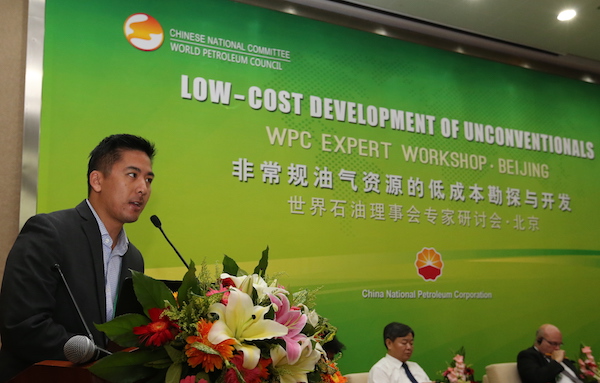
Rob Liou in a recent photo.
Liou worked with two graduate students and a professor from Guizhou University. The foursome traveled through the province extensively to visit farmers and sites where the tea was made. While there, Liou met a local husband and wife who provided funding to help the farmers market their tea.
“They weren’t really doing this for money, they just really wanted to make life better for the local farmers,” he said. “We wanted to help him because he and his wife were such sincere, caring, and passionate people. I feel like a lot of the best people I’ve met in China tend to typify those traits – very sincere, hard-working, and not necessarily after money.
“It made me want to come back after graduation, and it’s really what’s kept me here for the past six years.”
Liou’s hard work paid off. Two years after his internship, he was contacted by a U.S.-based tea importer who had seen an article about Liou’s internship on the WDI website and was interested in buying tea from the farmers. Liou put him in touch with the people running the tea company in Guizhou.
After Liou graduated from Ross, he went to work at China’s second-largest oilfield for a former state-owned enterprise. He began making contacts and learning about the industry. Later, he collaborated with some Houston-based Ross alumni who had started PacWest Consulting Partners, which provided research and consulting services with a focus on the global unconventional oil and gas industry. China is home to some of the world’s largest reserves of untapped shale natural gas.
“Using my network and their brains, we were able to scale up our presence here in Beijing quickly,” Liou said.
The firm was acquired in late 2014 by IHS, and Liou joined the company, working with local and global clients engaged in exploration and production activities.
Liou said the internship taught him a lot, lessons that stay with him still and provide daily inspiration. He recalled during his internship accompanying a friend who was studying energy trends in Guiyang, the province’s capital city, for her doctorate at Colorado State University. To help villagers accept Liou’s friend and make her research interviews easier, the two agreed to perform in a local singing festival. Dressed in native garb and wearing makeup, Liou and his friend sang a traditional Chinese song called “Jasmine Flower” in front of thousands of locals.
“It was hilarious, but it’s something I always reflect on because it taught me the importance of localizing in order to develop ‘guanxi,’ or relationships, and not being afraid to get myself out there and try new things,” he said.
As Liou continues to advance his career in China, he said he won’t forget what he learned while a WDI summer intern working overseas for the first time.
“How important it is to be humble,” he said. “To be passionate about what I do, and also to have good local language ability, people skills, and cultural adaptability in order to be effective in a foreign land.”
Note: This is one in an ongoing series of articles profiling past WDI interns and Multidisciplinary Action Project (MAP) team members and their career paths. Additional profiles in the series may be found here.